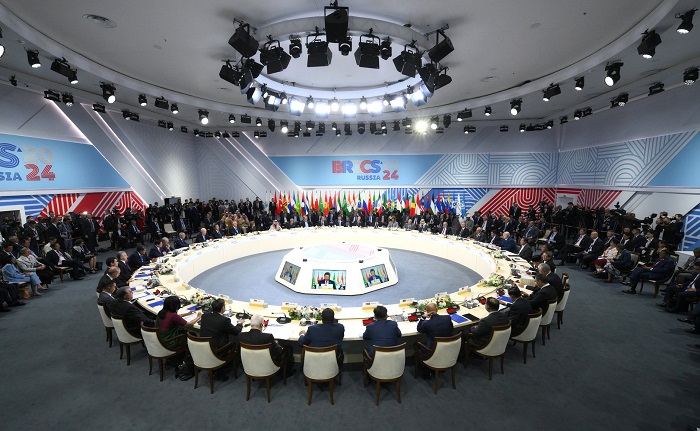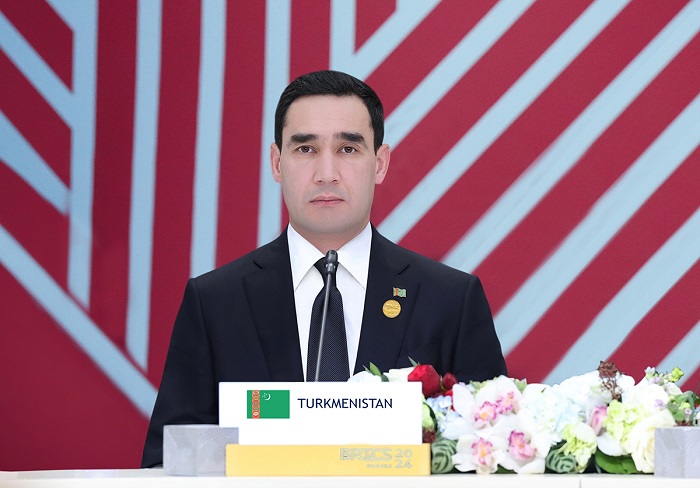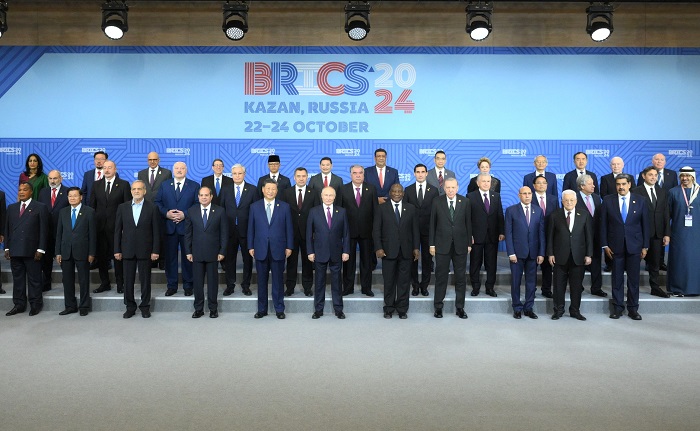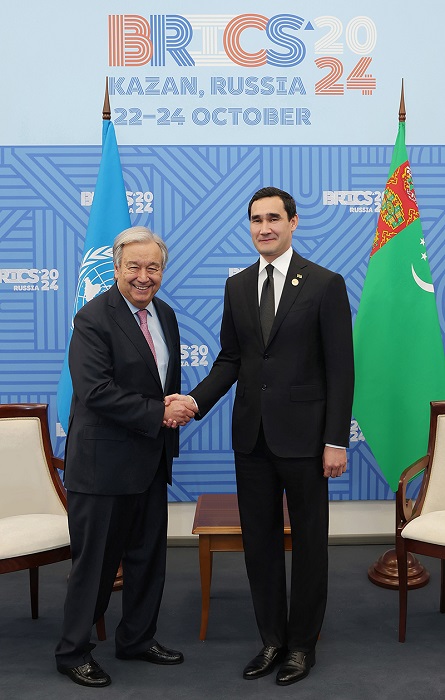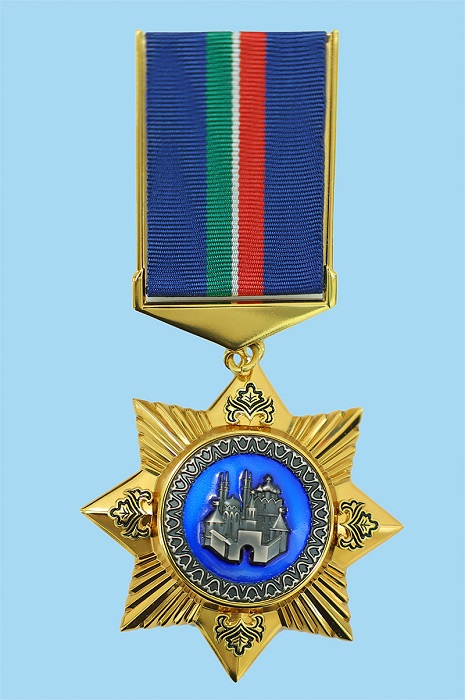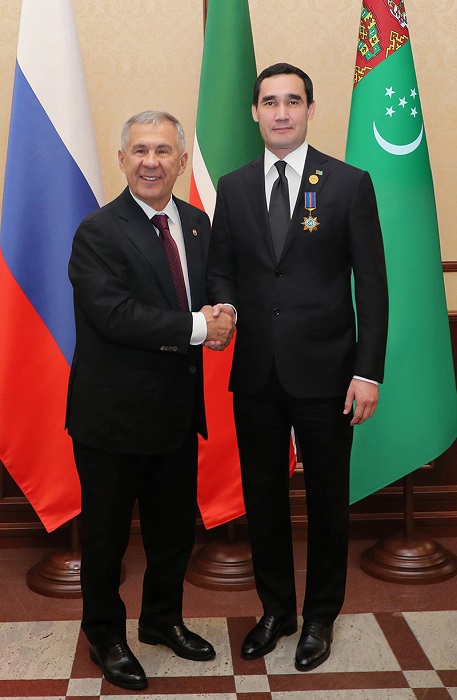During his visit to Kazan, the capital of the Tatarstan Republic of Russia, President Serdar Berdimuhamedov participated in the BRICS Summit as invited guest.
There were some other engagements unrelated to the summit.
Turkmen President speaks at BRICS Summit
Here is the speech of the president of Turkmenistan at the expanded-format (BRICS + Outreach) session of the summit:
Distinguished Heads of State, Ladies and Gentlemen,
First of all, I would like to thank the President of the Russian Federation, Vladimir Vladimirovich Putin, for his hospitality and warm welcome.
Turkmenistan participates in the BRICS + Outreach Summit for the first time. Thank you for the invitation to such a representative event, we see in this a respectful attitude towards Turkmenistan.
As is known, Turkmenistan takes an active part in the efforts of the international community aimed at achieving and establishing the principles of cooperation, mutual respect and consideration of interests in the world. Our country uses its neutral status to promote the peacekeeping agenda, ensure global and regional security, and establish a culture of equal dialogue, trust and predictability in interstate relations.
An important component of Turkmenistan’s foreign policy is the use of the model of neutrality, tools of preventive diplomacy to prevent conflict situations and eradicate the causes that give rise to them. We are convinced that in the current conditions the basic principles of neutrality are objectively in demand and, with the support of the international community, can bring real benefits to ensuring global security.
In this context, it is necessary to emphasize the special importance and high efficiency of the activities of the UN Regional Center for Preventive Diplomacy for Central Asia, which is headquartered in the city of Ashgabat.
As a responsible state, Turkmenistan proposes a number of measures aimed at normalizing and improving the international situation and moving to constructive parameters of interaction. In this regard, our country has made a number of serious proposals to the UN. Such as, in particular, the development of the Global Security Strategy, the Initiative to give neutral countries the status of priority partners of the UN in its peacekeeping efforts, as well as a number of proposals in the context of creating and strengthening regional security and stability.
A landmark event in this context was the unanimous support of the UN General Assembly for Turkmenistan’s initiative to declare the next year, 2025, the International Year of Peace and Trust. We hope that all states will take an active part in the implementation of the provisions of the relevant General Assembly resolution.
The international strategy of Turkmenistan is based on the involvement of the country in modern geo-economic trends, initiative participation in solving urgent problems of our time, fulfilling the Sustainable Development Goals, overcoming crisis situations in the environmental, food directions, creating and establishing equal, fair and reliable ways of access of countries and peoples to energy sources, clean water and air.
For this, our state also acts from an active and responsible position. I would like to draw your attention to the initiatives of Turkmenistan in the field of economy, energy and sustainable transport. In particular, we are talking about the development of a Global Framework Programme for the Transition to a Circular Economy.
Other initiatives include the creation of the Global Atlas of Sustainable Transport Connectivity and the Alliance for Global Energy Security and Sustainable Development.
In general, speaking about the current world geo-economic trends, Turkmenistan singles out one of their defining problems – the increasing importance of developing countries. They are largely designed to give new energy to the established, but already requiring constructive revision, old schemes of the world order, to bring new meanings and purposes into them. The key component here should be the equalization of the levels of scientific and technological development of states, digitalization and innovation standards; the unconditional priority of environmental criteria in the economy, trade, transport, industry, extraction and processing of raw materials, and a number of other areas. We intend to consistently achieve these goals.
A few words about the climate agenda. It is obvious that it will become key and will determine the entire trajectory of the path of human development in this century. Turkmenistan stands for the systematic consideration of climate issues as one of the basic components of the global approach to ensuring the architecture of security and development, the creation of multilateral mechanisms for monitoring and responding to climate, environmental and man-made cataclysms.
In the issues of environmental cooperation, Turkmenistan gives priority importance to the protection and preservation of the natural landscape in Central Asia, marine resources and biodiversity in the Caspian Sea, rational use of water and water and energy resources of these regions based on taking into account the interests of partners and generally recognized norms of international law.
We attach great importance to international cooperation in the humanitarian sphere, including resolving the problems of refugees and stateless persons.
In recent years, Turkmenistan has established good cooperation in these issues with the UN, the Organization of Islamic Cooperation, and a number of specialized entities, which has led to significant positive results at the national level. We are ready to share our experience and practical developments with other countries.
Our country also considers it important to give proper impetus to cooperation in the cultural, scientific and educational spheres. The expansion of knowledge about each other, the convergence of cultures, traditions, and original art is a beneficial process that unites peoples on a healthy, creative basis.
We are ready to establish such cooperation with partners and participate in the development of relevant plans for joint events.
Dear participants,
Once again, I would like to thank the organisers for the invitation to participate in this meeting, the opportunity to speak and share views and proposals.
In conclusion, let me express my gratitude to the organizers of the forum for the conditions created for successful and productive work.
On UN Day the President of Turkmenistan meets with United Nations Secretary-General
Today [24 Oct], during the XVI BRICS Summit, President of Turkmenistan Serdar Berdimuhamedov held a substantive meeting with United Nations Secretary-General António Guterres. This dialogue, held in a spirit of cooperation, focused on the current state and future prospects of the strategic and constructive relationship between Turkmenistan and the United Nations.
President Berdimuhamedov congratulated Secretary-General Guterres on United Nations Day, expressing confidence that their discussions would provide new momentum to the enduring partnership between Turkmenistan and the UN. The Secretary-General extended his gratitude for the warm welcome he received during his visit to Ashgabat earlier this year and expressed his best wishes to the National Leader of the Turkmen people, Chairman of the Halk Maslahaty for his leadership in establishing a peaceful foreign policy rooted in principles of openness and active international cooperation.
Both sides acknowledged the importance of Turkmenistan’s policy of positive neutrality, recognized by the international community and enshrined in the country’s Constitution. As a neutral state, Turkmenistan continues to expand its global relationships and partnerships with leading international organizations, including the UN. President Berdimuhamedov highlighted that multi-faceted cooperation with the United Nations remains a priority for Turkmenistan, which fully supports global initiatives for peace, security, and sustainable development under the UN’s leadership.
During the meeting, discussions focused on expanding cooperation in priority areas. The talks underscored Turkmenistan’s active role in the international arena, supporting strong relationships with UN agencies, particularly in areas like environmental protection. President Berdimuhamedov reaffirmed Turkmenistan’s commitment to close cooperation in ecological matters, emphasizing the country’s adherence to key UN environmental conventions.
The meeting also highlighted Turkmenistan’s role as a reliable long-term partner for the UN in Central Asia—a region experiencing rapid development. Regional countries are committed to multilateral cooperation to ensure global peace and achieve the Sustainable Development Goals. The UN Regional Centre for Preventive Diplomacy for Central Asia has been instrumental in these efforts, working towards specific regional objectives.
Additionally, the two leaders discussed health cooperation as a critical area of engagement. Turkmenistan’s long-standing collaboration with the World Health Organization (WHO) was acknowledged, particularly in promoting public health, sports, and improved medical services – a dedication praised by the UN.
President Berdimuhamedov reiterated Turkmenistan’s commitment to further expanding constructive dialogue with the UN based on mutual respect and long-term partnership. Secretary-General Guterres emphasized that Turkmenistan remains a key partner for the UN in advancing global peace, security, and sustainable development.
President Serdar Berdimuhamedov awarded the Order of the Republic of Tatarstan “Duslyk”
Today [24 Oct], President of Turkmenistan Serdar Berdimuhamedov, who is on a working visit to Kazan, met with the head of the Republic of Tatarstan of the Russian Federation Rustam Minnikhanov.
During the meeting, an interested exchange of views took place on priority issues of the Turkmen-Tatar partnership. In this regard, it was emphasized that one of the main factors of systemic and effective bilateral cooperation is regular meetings and contacts at the highest level.
After the meeting, the ceremony of awarding the President of Turkmenistan with the Order of the Republic of Tatarstan “Duslyk” took place.
President Serdar Berdimuhamedov was awarded this high state award for special merits in strengthening friendship and cooperation between Turkmenistan and the Republic of Tatarstan, other subjects of the Russian Federation, for a significant contribution to the development of bilateral trade and economic, scientific and technical, social and cultural cooperation.
In a solemn atmosphere, the Rais of the Republic of Tatarstan of the Russian Federation presented the President of Turkmenistan with the Order of “Duslyk”, expressing heartfelt congratulations and best wishes in this regard.
Putin addresses press conference after BRICS Summit
Ladies and gentlemen! The 16th BRICS summit has just ended successfully.
It became the culmination of Russia’s chairmanship of the association and one of the notable events on the world political calendar.
I have said more than once that Russia approaches the performance of its duties as BRICS chairman responsibly. More than 200 events have been held in thirteen Russian cities. In particular, numerous meetings of industry ministers took place, various conferences, seminars, and a Business Forum were held. Sports games were also held with great success.
This year we have already worked in a renewed, expanded composition, and Russia, as the chairman of the association, did everything possible so that the new members of the organization would join our family as quickly and organically as possible. And we have succeeded in this, in my opinion.
New participants saw and understood that it is possible to work and achieve results in BRICS. They felt that our association has the most important thing – mutual respect and mandatory consideration of each other’s interests. I can state with satisfaction that all of them take the most active part in working forums, put forward useful, promising ideas and initiatives.
As for the Kazan summit itself, delegations from 35 states and six international organizations took part in it, as you already know. Such a broad representation clearly demonstrates the authority and role of BRICS, the growing interest in interaction with us on the part of states that in fact pursue a truly independent, sovereign policy.
Each of these states has its own development path, its own models of economic growth, rich history, and culture. It is precisely in this civilizational diversity, the unique combination of national traditions, that the strength and enormous potential for cooperation lies, of course, not only within the BRICS framework, but also in the large circle of like-minded countries that share the goals and principles of the association.
The summit program was very eventful. Meetings of BRICS member countries were held in narrow and wide formats, focused on current issues of the association’s activities and prospects for expanding partnership in three main areas: in the sphere of politics and security, in trade and investment, and on the cultural and humanitarian track.
Traditionally, a meeting was held in the “outreach” / “BRICS Plus” format. This format has proven itself well and already provides an opportunity for direct and open dialogue between the members of the association and our friends and partners from among the states of the Global South and East. This year, the Russian presidency invited the leaders of the CIS countries to such a meeting, as well as delegations from many states of Asia, Africa, Latin America, as well as the heads of executive bodies of a number of international organizations.
We exchanged views on key international issues with an emphasis on the aggravated situation in the Middle East. We also considered prospects for cooperation between BRICS members and countries of the Global South and East in the interests of inclusive sustainable development.
The main thing is that all the meetings and events I just mentioned, without exception, were held in the traditional BRICS businesslike and open manner, in an atmosphere of mutual understanding. Such a constructive approach to joint work allowed us to thoroughly discuss the widest range of issues over the course of three days.
The BRICS Kazan Declaration was approved at the summit, summarizing the discussions that took place. In our opinion, the result is a comprehensive conceptual document with a positive agenda aimed at the future. It is important that it confirms the commitment of all our states to building a more democratic, inclusive and multipolar world order based on international law and the UN Charter, and records a common determination to counter the practice of applying illegitimate sanctions and attempts to undermine traditional moral values.
The BRICS countries are committed to deepening their partnership in the financial sector. We will continue to strengthen interbank communication and work on creating mechanisms for mutual settlements in national currencies that are independent of external risks.
Gist of Kazan Declaration
Here is a highly condensed version of the Kazan Declaration, issued after the BRICS Summit:
[Generated by AI]
The Kazan Declaration, issued at the XVI BRICS Summit in Kazan, Russian Federation, on 23 October 2024, reaffirms the commitment of BRICS nations (Brazil, Russia, India, China, and South Africa) to multilateralism and a just global order.
Key points include:
- Strengthening Multilateralism: BRICS supports a reformed, more inclusive multilateral system, including UN Security Council reform, and opposes unilateral coercive measures.
- Economic Cooperation: The declaration emphasizes sustainable development, debt relief, and a reformed international financial architecture. It also supports the New Development Bank’s role in infrastructure development and explores local currency usage in trade.
- Global Stability and Security: BRICS calls for peaceful conflict resolution, condemns terrorism, and supports disarmament efforts. It expresses concern over various regional conflicts, including the situation in the Middle East, Ukraine, and Sudan.
- People-to-People Exchanges: The declaration highlights the importance of cultural and educational exchanges, youth engagement, and cooperation in science, technology, and innovation.
Link to complete text of Kazan Declaration: http://static.kremlin.ru/media/events/files/en/RosOySvLzGaJtmx2wYFv0lN4NSPZploG.pdf
Overall, the Kazan Declaration reflects BRICS’s vision for a more just, multipolar world order and its commitment to addressing global challenges through cooperation and dialogue.
Some other points from the Kazan Declaration, as noted by CNBC:
Global Governance and Multilateralism
G20 Role: The summit underscored the importance of the G20 in global decision-making. “We recognise the importance of the continued and productive functioning of the G20, based on consensus with a focus on result-oriented outcomes.”
Financial Architecture Reform: The BRICS nations reiterated their pledge to improve global governance by advocating for a more agile, responsive, and representative multilateral system. This includes reforms to the international financial architecture and promoting inclusive growth.
“We reiterate the importance of further enhancing BRICS solidarity and cooperation based on our mutual interests and key priorities and further strengthening our strategic partnership,” the leaders added. “We underscore the need to reform the current international financial architecture to meet the global financial challenges.”
Financial Innovation: The leaders encouraged new financial practices. “We welcome the BRICS Interbank Cooperation Mechanism (ICM) focus on facilitating and expanding innovative financial practices.”
International Monetary Fund: The declaration supported maintaining a strong IMF. “We reaffirm our commitment to maintaining a strong and effective Global Financial Safety Net with a quota-based and adequately resourced IMF at its centre.”
Economic Cooperation and Local Currencies
Cross-Border Payments: A key highlight of the summit was the agreement to strengthen trade and financial settlements in local currencies. The declaration welcomed the use of local currencies in BRICS financial transactions and supported the exploration of an independent cross-border settlement infrastructure.
“We recognise the widespread benefits of faster, low-cost, more efficient, transparent, safe, and inclusive cross-border payment instruments built upon the principle of minimising trade barriers and non-discriminatory access,” the document stated.
BRICS Clear depository: Looking ahead, the BRICS nations agreed to explore initiatives that could further integrate their economies, such as establishing a BRICS Grain Exchange and studying the feasibility of a BRICS Cross-Border Payment System and BRICS (Re)Insurance Company.
BRICS Grain Exchange: The establishment of a BRICS-based grain exchange was welcomed. “We welcome the initiative of the Russian side to establish a grain (commodities) trading platform within BRICS.”
BRICS Plus Partnership: With growing interest from nations in the Global South, the leaders endorsed the creation of a BRICS Partner Country category, welcoming new member countries, including Egypt, Ethiopia, Iran, Saudi Arabia, and the UAE.
Pandemic Preparedness and Environmental Conservation
Health Initiatives: The summit emphasised the importance of strengthening health systems through collaboration. “We support the initiatives of the BRICS R&D Vaccine Center, further development of the BRICS Integrated Early Warning System for preventing mass infectious diseases risks and the operations of the BRICS TB Research Network.”
The leaders also recognised the threat of antimicrobial resistance (AMR): “We welcome the outcomes of the 79th United Nations General Assembly (UNGA) High-Level Meeting on AMR… and note the timeliness of holding the first BRICS Conference on AMR in May 2024.” /// nCa, 25 October 2024 (with input and pictures from Permanent Mission of Turkmenistan at the UN, Official website of President of Russia, Official website of BRICS Summit, TDH, other media outlets)
